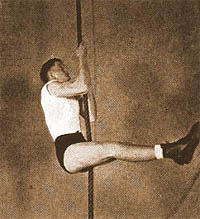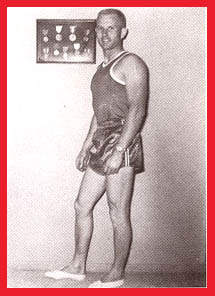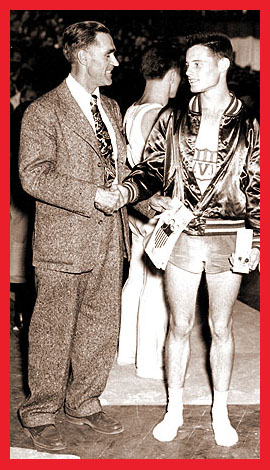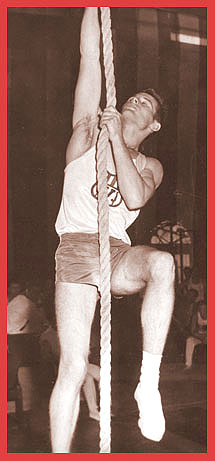A Few Historical Details . . . . . . In 1544 a German primer on gymnastic activities recommended rope climbing for children and adults, though not competition. The Hellenic Games of 1859 included the competitive event in some form and the 1896 Olympics included the event in its gymnastics competitions, where it remained through the 1932 Games. Near the finish, but with faltering form
 A Navy gymnast (1940s) doing the L-position climb In the 1904 Games in St. Louis, it would appear that the length of the rope had been reduced to 25 feet (7.62 meters), and speed must have been the sole grading criterion - it is probable that the rigid L-position previously required had been abandoned - for the event was won by an American, George Eyser, in a time of 7.0 seconds. (Eyser had a wooden leg!)  An
interim Games was held in 1906, with G.
Alimbrantis winning gold in rope
climbing. In these Games, the rope was 10 meters long, and the
winning time was 11.4 seconds. An
interim Games was held in 1906, with G.
Alimbrantis winning gold in rope
climbing. In these Games, the rope was 10 meters long, and the
winning time was 11.4 seconds.
The 1906 (outdoor) rope climbing
event
In the 1924 Olympics in Paris the length was 8 meters - B. Šupčik won with a time of 7.2 seconds. And in the 1932 Games in Los Angeles, another American, Raymond (Ben) Bass, won with a time of 6.7 seconds for 25 feet (7.62 meters). After rope climbing was discontinued in the Olympics (post 1932), it remained a viable competitive gymnastic event in America , sanctioned by the AAU and NCAA, for another thirty years. But, at some point, climbing a slightly shorter rope became more popular. In 1936, Thomas Gucker III of Princeton established a world record of 3.8 seconds for the 20 foot climb. Even twenty years later, the best times in, for instance, the Southern Intercollegiate Gymnastic League - where the 20' rope was used - were in this range. The sport reached its zenith in the 1950s in the AAU and NCAA gymnastic competitions and the Pan American Games.  Three top competitors of
that period were Garvin Smith (Cal State at LA), Robert Manning
(LA Turners), and Donald Perry (UCLA). Perry won a
series of titles during 1948, 1949, 1950, 1952, 1953, and 1954. He won
the 1954 NCAA title for the 20' climb with an astounding
time of 2.8 seconds. In addition,
he won the 1955 Pan-American Games in Mexico City with a time
of 2.9 seconds, showing his record the
previous year was no fluke. Manning won the AAU titles in
1955, 1956, 1957, and 1958. In 1958, he won the AAU title
with a time
of 2.8 seconds, the second climber to
post that time. And in 1962 Paul
Davis,
a Berkeley gymnast, equaled Perry's 2.8 second record for the NCAA
title. Three top competitors of
that period were Garvin Smith (Cal State at LA), Robert Manning
(LA Turners), and Donald Perry (UCLA). Perry won a
series of titles during 1948, 1949, 1950, 1952, 1953, and 1954. He won
the 1954 NCAA title for the 20' climb with an astounding
time of 2.8 seconds. In addition,
he won the 1955 Pan-American Games in Mexico City with a time
of 2.9 seconds, showing his record the
previous year was no fluke. Manning won the AAU titles in
1955, 1956, 1957, and 1958. In 1958, he won the AAU title
with a time
of 2.8 seconds, the second climber to
post that time. And in 1962 Paul
Davis,
a Berkeley gymnast, equaled Perry's 2.8 second record for the NCAA
title. Robert Manning In the 1947 AAU competition Smith set the existing world record for the 25' climb, at 4.2 seconds. Garvin Smith won the Pan-American Games title in 1959 at Navy Pier in Chicago with a time of 3.0 seconds for the 20' climb. I was there at the time, the last year the Games included the rope climb event. By 1963 both the 20' and the 25' competitions had been discontinued in the AAU and NCAA as well. . .
.
Don Perry -AAU
Champion ( 1948),
Coach Hughes, Venice CA HS Photos courtesy A. B. Frederick The world record of 2.8 seconds for the 20' climb established by Don Perry of UCLA is faster than most people can pull a loose 20' rope on the floor between their legs! Those athletes who broke the 3 second barrier were phenomenal. . .
.
The sport of competitive rope climbing was revived in the Czech Republic in 1993, and the current world record holder for the 8 meter climb could be Martin Masár , who in a national competition in 1997 recorded a time of 5.58 seconds. |

